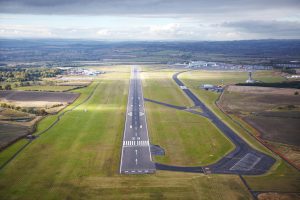After the completion of a refinancing and the arrival of AMP Capital as its new 49 per cent shareholder following Copenhagen Airports’ sale of its own stake, Newcastle International Airport is looking to the future on a solid platform. The global investment manager has relevant expertise in the industry through its involvement in Melbourne and Launceston Airports in Australia and it is currently working with local government majority shareholder LA7 (North East local authorities – South Tyneside, Newcastle, Sunderland, Gateshead, Northumberland, Durham and North Tyneside) on a development vision for the airport.

In the next month this will include a review of the airport’s route development strategy and the formulation of a five year plan for network growth. The Airport is a major asset to the North East of England, generating millions of pounds for the local economy every year and supporting thousands of jobs. It would be wrong to say that the region is remote, after all the Tyneside urban area is the sixth largest living area across the UK, but this is partly true with the North East of England the only major UK region not connected to the rest of the country by a motorway. With long journey times to other larger UK airports the importance of direct domestic and international connectivity is high, an issue that has again been highlighted in a report released in April 2013.
The More and Better Jobs: North East International study from Lord Adonis has again highlighted the important role of air connectivity to the North East of England. It was commissioned by the North East local enterprise partnership which comprises representatives from councils between Northumberland and Durham, themselves shareholders in the airport. The report said “ever stronger links from Newcastle Airport to the major global air hubs are required, plus continuing direct flights to the more distant British cities”.
The report highlighted a goal of maximising the number of global destinations that can be reached from the region with just a single change of aircraft and following the success of the Dubai connection said the “top priority” for the future has to be a new direct flight to a major North American air hub.
For the airport’s management team this is nothing new. They have been working hard to bring a direct US connection and came close to establishing a scheduled link to New York in the last decade, but have instead had to make do with some special Christmas Holiday flights to the Big Apple from leisure carrier Jet2.com. But, the airport’s Aviation Development Director, Chris Sanders, who has worked in the role since 1999 having moved across from the railway business, acknowledged this would be a challenge in the current environment. “All the factors are pushing against us at the moment with the state of the economy, Air Passenger Duty (APD), the pound-dollar exchange rate, fuel prices, restructuring in the US airline business… the list goes on. However, the business case for a non-stop link to a US hub is actually much stronger than the business case when Emirates launched Dubai,” he said.
“Last year was a great year for the airport as well as the North East travelling public. We secured a number of new routes to sought-after destinations, were honoured with the AOA Award for best UK airport under six million passengers for the fourth year in the row and welcomed a 50 per cent increase in seats on our Emirates service to Dubai with the debut of the 428-seat Boeing 777-300ER. We also officially opened our £3.2 million terminal development.”
Chris Sanders
Aviation Development Director, Newcastle International Airport
The arrival of Emirates in the North East of England was a major coup for Newcastle. The carrier already had a strong presence in the UK, and although the route filled a market gap between its existing destinations of Manchester and Glasgow, Newcastle International Airport had little pedigree as a long-haul destination. When you consider that at this time Emirates hadn’t set course for destinations such as the Dutch capital Amsterdam, now an Airbus A380 service, you can understand why there was this level of surprise.
But what benefits does such a service bring alongside the obvious enhanced connectivity. A UK Trade & Industry report suggests that since Emirates Airline made its debut in the North East of England in September 2012 there has been a notable boost to exports and trade. The analysis shows a rise in trade from £150 million to £275 million between the North East and Australasia over the period. A study of the International Passenger Survey, UK Civil Aviation Authority (CAA) Passenger Survey and CAA Statistics also leads to an estimate that inbound passengers on the Dubai service will spend around £16.7 million in the North East of England.
There are suggestions that the route could be expanded to a double daily operation within the next few years such has been its success. Official statistics shows that just 25.2 per cent of passengers travelling on the airline’s service end their journey in Dubai, the rest connect onto at least one other flight via the global gateway. In fact, the Emirates Airline service enabled passengers from Newcastle International to fly to 152 different destinations via Dubai in 2011.
Away from these long-haul markets the airport has plans to further expand its domestic and European offering as well as strengthening operations to existing markets. The return of an important link to Brussels is a priority after Brussels Airlines pulled the route at short notice earlier this year, while the Continental European network wishlist includes a range of other destinations including Berlin, Madrid, Milan; markets Sanders believes can be sustainably served on a twice or three times weekly basis. In the UK, the return of a London Stansted link is one option for growth, although more favourably the airport would like to see the introduction of a jet aircraft on Flybe’s London Gatwick flight replacing the existing Bombardier Dash 8-Q400 with an Embraer 175.

With financial stability the airport’s management plans to use its twin pillars of excellent customer service and reliability to provide an efficient and sustainable environment for its existing airline partners, potential new operators and its passengers. It performed well in recent UK CAA punctuality data and was last year awarded the title of ‘best UK airport under six million passengers’ for the fourth year running by the Airport Operators Association (AOA).
“Our aim is to be the most welcoming airport in the UK and this year, we’re going above and beyond once again for our customers,” said Sanders. “Last year was a great year for the airport as well as the North East travelling public. We secured a number of new routes to sought-after destinations, were honoured with the AOA Award for best UK airport under six million passengers for the fourth year in the row and welcomed a 50 per cent increase in seats on our Emirates service to Dubai with the debut of the 428-seat Boeing 777-300ER. We also officially opened our £3.2 million terminal development.”
A small growth in passenger numbers in 2012 ended five consecutive years of declines and following only a modest decline in 2011 shows stability in the local market. Latest data from the UK CAA data shows positive growth for the rolling 12 month period until February 2013 with traffic up 0.6 per cent from to 4.34 million passengers, ranking it as the country’s eleventh largest facility. Much of this growth again relates to the success of the Emirates route to Dubai, but also an increase in flying from easyJet which has just celebrated its tenth anniversary of operations at Newcastle.
The airport is now looking to the future and is in the process of redeveloping its master plan strategy which will show its aspirations up to 2030. It is currently a key business in the North East of England providing both employment opportunities and driving the development of the local economy. According to latest company data, the airport employs 3,200 people on site and contributes more than £646 million to the North East every year. It supports £182.4 million in Gross Value Added (GVA) through on-site activity, £27.4 million through directly related off-site activity and £135.7m in GVA through indirect and induced effects in the North East. While, on the basis of 2012 traffic levels, analysis by York Aviation suggests the services provided by the Airport will bring economic benefits of £243.2 million to the region.
“It amazes me when you look at events like these events and the number of lives that will be changed for the better, the growth in business and the economic development the decisions that are taken will bring to any country. I really wish the UK Prime Minister and other senior Government officials could take time and visit a Routes event, see what goes on and how important this industry is.”
Chris Sanders
Aviation Development Director, Newcastle International Airport
A key part of Newcastle’s network development strategy involves attendance at the spring Routes Europe regional event and the autumn World Routes forum. For Sanders this is an important part of his annual diary and he has attended each Routes Europe since 2009, while he has been at almost every World Routes event. “The events on one hand enable us to maintain relationships with existing customers, where it would difficult and expensive to see them all. On the other hand it allows us to speak to potential new partners while also catching up with industry colleagues to better understand developments across the sector all across a three day period,” said Sanders.
He also had a special message for the UK Government. “It amazes me when you look at events like these and the number of lives that will be changed for the better, the growth in business and the economic development the decisions that are taken will bring to any country. I really wish the UK Prime Minister and other senior Government officials could take time and visit a Routes event, see what goes on and how important this industry is,” said Sanders. A good time perhaps to highlight that Emirates’ daily Dubai service from Newcastle will raise around £8.5 million for the Government through its controversial Air Passenger Duty tax.





